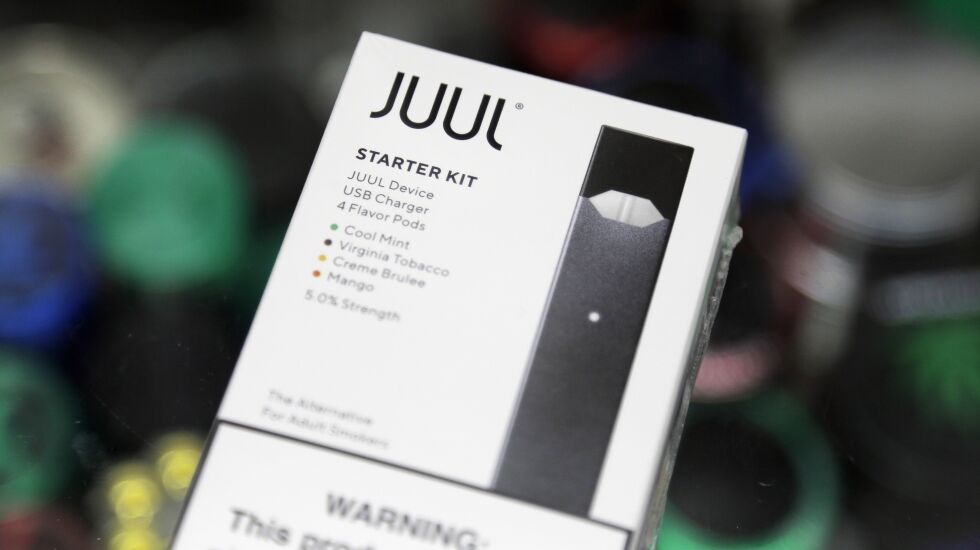
Illinois will receive $67.6 million as part of a multi-state settlement with e-cigarette manufacturer Juul Labs.
The news was announced in a news conference Wednesday by Illinois Attorney General Kwame Raoul, as well as attorneys general from New York, California, Massachusetts and the District of Columbia. The suit also included New Mexico and Colorado.
The settlement comes after years of legal action against Juul alleging the company targeted minors with their advertising and misled consumers about the product’s health risks. Juul has already settled numerous similar lawsuits and faced bans and regulations from the FDA.
Last summer, the FDA banned Juul products in the U.S., but the company’s rechargeable vapes and nicotine cartridges have remained on shelves as the agency issued a stay to conduct further review.
Juul will pay $462 million to settle this lawsuit, the largest settlement against the company yet, New York Attorney General Letitia James said during the conference. The ruling also requires Juul to follow more stringent regulations of its marketing and sales.
Illinois has been “aggressively litigating” against Juul since 2019, when Raoul took office.
He added that the matter became personal for him when his teenage children brought e-cigarettes home.
“As important as money is to hold bad actors accountable ... changing conduct is more so, particularly with this industry,” Raoul said.
The money Illinois receives from this lawsuit will go toward awareness and treatment programs, as well as efforts in conjunction with public health officials, school districts and community partners, Raoul said, though no details were offered.
Juul will no longer be allowed to show people under 35 in its advertising, James said. She added that Juul also must take further measures to secure its products behind store counters and verify buyers’ ages.
In Chicago, the City Council is working to curb the “astronomical use” of e-cigarettes among the city’s youth. An ordinance passed in January requires a new license for retailers that derive 20% of their gross revenue from e-cigarettes and related products.
City Council voted to ban flavored liquid nicotine products in 2020, stopping short of banning all flavored tobacco products, like menthol cigarettes.
Last month, Chicago settled with Juul for $23.8 million in a lawsuit that alleged Juul marketed and sold to minors. The money from that settlement will go toward education and other programs to prevent vaping among teens, according to Mayor Lori Lightfoot’s office.
Robin Koval is the CEO of the Truth Initiative, a non-profit anti-smoking organization that has expanded its advocacy to include vaping. She called the multi-state settlement “an important milestone.”
Nicotine can damage young people’s developing brains and exacerbate mental health issues like depression and anxiety, Koval said.
A statement from Juul called this settlement a “critical part in our ongoing commitment to resolve issues from the company’s past” on Wednesday. In 2019, the company went through a “reset,” which involved pulling marketing campaigns and flavored pods.
In 2020, the FDA banned the sale of flavored nicotine pods or cartridges, which it determined were contributing to demand among underage users.
Juul’s statement cited National Youth Tobacco Survey data showing underage Juul use has declined by 95% since its reset. Now, the survey reports more young people are using disposable vapes instead, which are often flavored. A quarter of middle and high school students vape every day, according to the survey.
Raoul said Juul represented three-fourths of the market for e-cigarettes in 2018. Now, Juul is not listed as one of the most popular brands among e-cigarette users in middle and high school in the National Youth Tobacco Survey.
Juul maintains its products offer a safer alternative to cigarettes for adult smokers. Raoul called these claims, as well as claims that e-cigarettes can help smokers quit traditional cigarettes, “false, particularly with regards to our youth.”
Raoul said vape products like Juul have become “a gateway to traditional combustible cigarette use for unsuspecting youth.” He pointed to statistics that show e-cigarette use puts young people at a higher risk for becoming traditional cigarette smokers.
Koval said she is pleased these “hard-won funds” will go toward abatement and prevention programs to “undo the damage done by Juul.” The Truth Initiative offers cessation and education programs targeted at young people.
“Our efforts, culminating in a settlement announced today, are one step in fighting the epidemic of youth vaping,” Raoul said. “Both the injunctive terms and the money Juul must pay will help these states combat the pernicious problem Juul largely helped create.”







